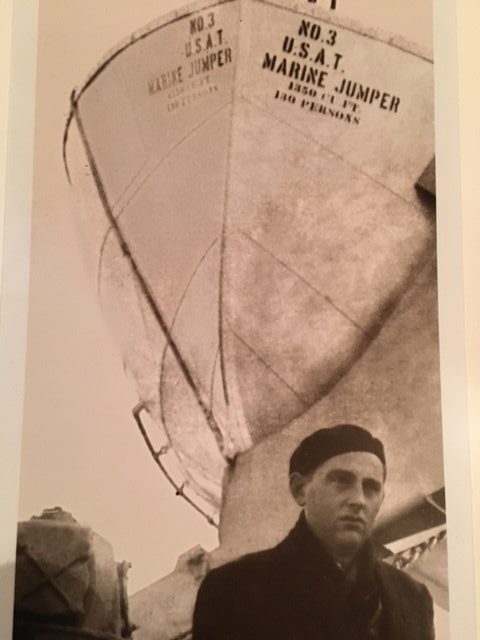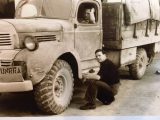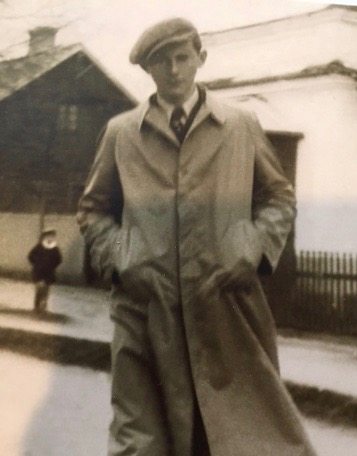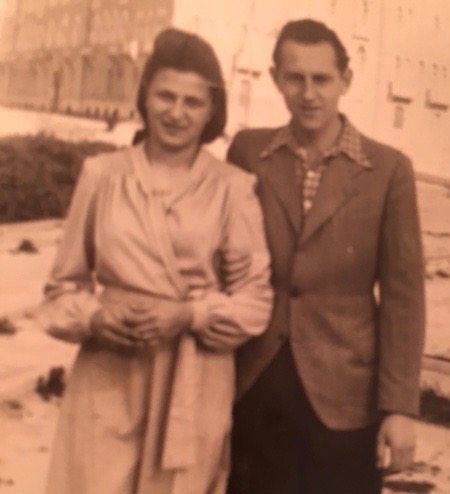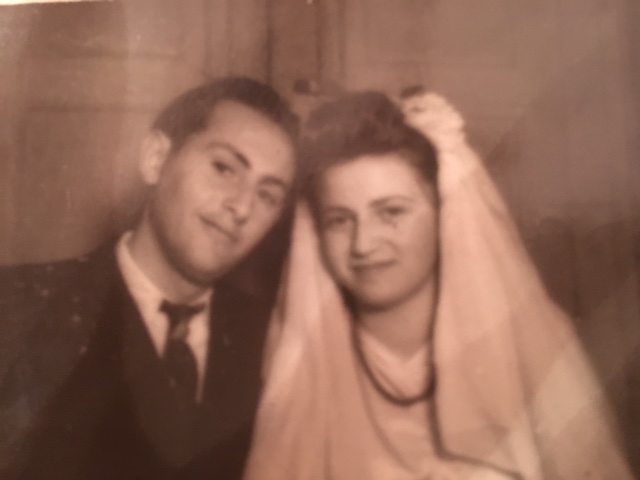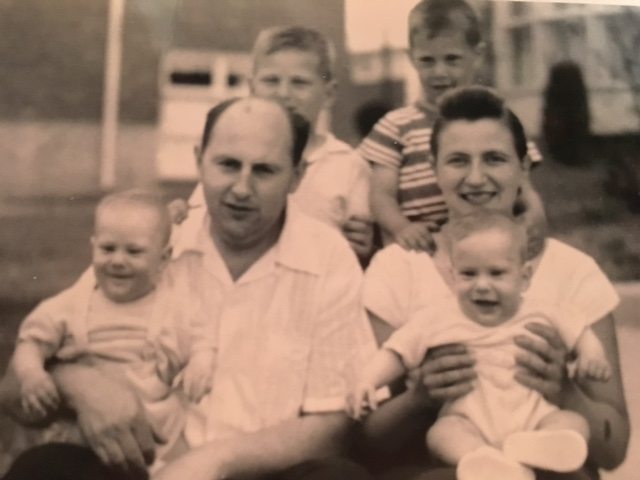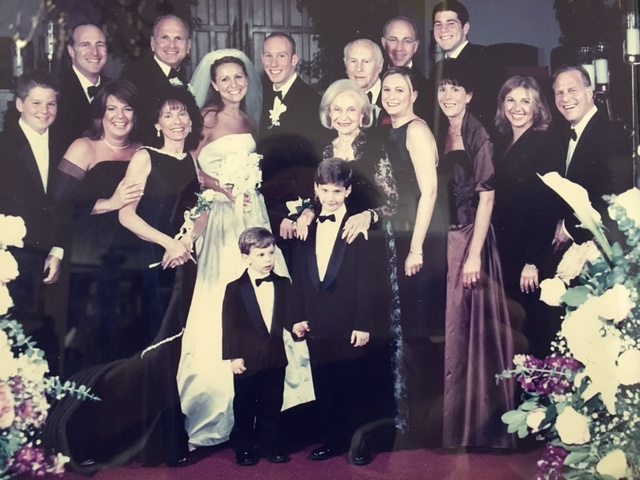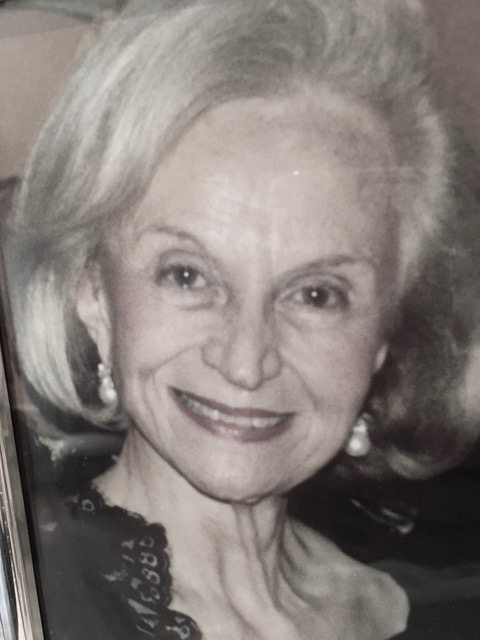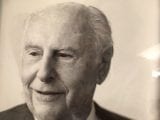- Local Survivor registry
- SOL KRAWITZ
- Local Survivor registry
- SOL KRAWITZ
Survivor Profile
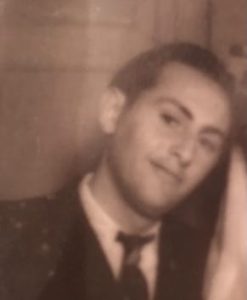
SOL
KRAWITZ
(1923-2009)
PRE-WAR NAME:
SHOIL DOEF KRAWEIC
SHOIL DOEF KRAWEIC
PLACE OF BIRTH:
SIEMIATYCZE, POLAND
SIEMIATYCZE, POLAND
DATE OF BIRTH:
DECEMBER 23, 1923
DECEMBER 23, 1923
LOCATION(s) BEFORE THE WAR:
SIEMIATYCZE, POLAND
SIEMIATYCZE, POLAND
LOCATION(s) DURING THE WAR:
GHETTO, SIEMIATYCZE; FOREST AND PARTISAN RESISTANCE, POLAND
GHETTO, SIEMIATYCZE; FOREST AND PARTISAN RESISTANCE, POLAND
STATUS:
SURVIVOR, REFUGEE
SURVIVOR, REFUGEE
RELATED PERSON(S):
HELEN KRAWITZ - Spouse (Deceased),
HAROLD KRAWITZ - Son,
SHARON, JULIE Grandchildren ,
OLIVIA, AARON, TYLER, SIENNA Great-Grandchildren ,
MARK KRAWITZ - Son,
BRIAN, STEVEN Grandchildren ,
SOLOMON, SAMUEL Great-Grandchildren ,
STUART KRAWITZ - Son,
JOSHUA - Grandson,
SCOTT KRAWITZ - Son,
STEFAN, SASHA Grandchildren ,
ISABELLA Great-grandchild ,
EMILIA Great-grandchild ,
HARRISON BEAR Great-grandchild
-
BIOGRAPHY BY sandra krawitz and the krawitz family
BIOGRAPHY COMPLETED BY THE KRAWITZ FAMILY:
Harold Krawitz, together with his wife, Sandra Krawitz, residents of Somerset County, NJ
Mark Krawitz, together with his wife, Marsha Krawitz, residents of Somerset County, NJ
Stuart Krawitz, together with his wife, Lynda Krawitz, residents of Allentown, PA
Scott Krawitz, together with his wife, Simona Krawitz, residents of New York, NY
Sol Krawitz died in Allentown, PA on September 29, 2009 (his wife’s birthdate).
Sol was born on December 23, 1923, in Siemiatycze, Poland. His father was mugged and murdered when his mother was pregnant with him. His mother re-married and had 3 more sons, named Meyer, Vafket, and Shula, and a daughter name Gittle. Sol’s stepfather did not accept him, because he was not his natural born child. Sol was made to work hard, and received little comfort in return. He was treated like the “black sheep” of the family. Sol’s mother tried to protect him, but as in many European families, the father was in control. So Sol became a street kid; often he even slept in the street. It was a very depressing childhood.
The maternal side of Sol’s family was large. His grandmother bore twelve daughters and two sons. His grandfather, named Yankel Shushkus, became his one true friend and protector. He would find him in the street and bring him back to his own home. Some nights Sol would sleep in his grandfather’s bed. Sol remembers one of these nights very vividly, when he was about seven years old. In an effort to comfort his grandson, Yankel made a prediction. He told Sol to look very carefully at the painting hanging on the wall in the room, which contained the image of two angels. He said that Sol would face some very difficult times ahead, but that these two angels would always protect him. His grandfather died a few years later, before the war began. Sol was devastated by the loss, and he would remember the story about the two angels for the rest of his life.
Before the war, Sol’s family consisted of about one hundred people. Everyone made a living from the meat business. It was a meager living, however, and money was always short. The family was religious. According to Sol, if you were not a religious person you would be ostracized. Siemiatyzcze had a Jewish population of about six thousand people, and it was a close knit community. Sol described himself as having a strong sense of Jewish identity without being very observant. He did not like to go to synagogue, but he believed in G-d.
When Sol was about sixteen years old, the Germans invaded the neighboring town of Drohiczyn, and began evicting all its Jews from their homes. Among these evicted Jews was a family of four people who had met Sol’s family before and although they did not know each other well, they took shelter with Sol’s family for a short time. One of the children in the family was Helen Turnowsky, who was ten years old at the time. Sol would meet up with her again several years later.
Soon enough, the Germans made their way to Sol’s town and the Siemiatyzcze Jews, including all of Sol’s family, were forced from their homes and locked into ghettos. All of their worldly possessions were confiscated. Not long after, the Germans began to liquidate the ghetto, and load the residents onto trains bound for Treblinka. The Jews knew where they were going. They had already witnessed atrocities at the hands of the Nazis and heard rumors about the gas chambers. As the trains were being loaded, Sol was forced to board a train separate from his family. This was the last time he would see any of his family members.
In later years, Sol would say that maybe it was lucky that he was without family on that train to Treblinka. If he had stayed with the rest of them, his ultimate destination would surely have been the same as theirs – the gas chambers. Maybe it was this feeling of lonely desperation that gave him the courage to do what he did next.
Sol’s train approached a station that was heavily guarded by armed German soldiers. He could see them on the roof of the station. He was a skinny kid, and he and two other boys decided to try to jump out of the small window at the top of their compartment. As the train slowed down, he pushed the other boys out, and then jumped out himself. The train hid them and they scrambled up the side of a berm and out of sight. They were already so close to Treblinka, they could see the fire from the incinerators.
It was a cold November night and the three boys could hear gunshots and screams nearby. They ran in different directions. Sol came to a farm and hid under some hay. At daylight, the farmer came out and discovered him. The farmer told him to “run away or I will kill you, because if the Germans find you here they will kill both of us.” Sol ran and came upon the small town of Bransk. Here he tried to beg for food from the local farmers, but wherever he went he was turned away.
Hungry and cold, Sol lay down near a highway. He could hear the German army passing by. When he felt it might be safe to get up, Sol began walking, and came upon a neighborhood he recognized. He knew some of the residents, and found a Jewish family that was willing to help him. One of their members had already been killed. They told him that there was a group of young men hiding in the woods, and he should try to find the group, as they were helping Jews hide from the Germans. Sol went into the forest and searched until he found the group. Others were joining the group of partisans as well and they began to develop an organized plan for survival. It was now 1941.
The partisans would “visit” the local farms. They were able to obtain some weapons, and then food and shelter for Jews by threatening to perform murderous acts of revenge if the farmers refused to help or turned them in. The Germans were always on the hunt for Jews who might be hiding on the farms.
One day a few soldiers stormed into a farmhouse where Sol and a few others were hiding. Several people were killed. Sol jumped from a window and ran into the woods. The Germans shot at him, but he escaped unharmed. Later he would find holes where the bullets had grazed the sides of his jacket. Sol’s guardian angels were watching over him. Luckily for the partisans, the Germans almost never entered the forest. They knew that armed resistance fighters were hiding under cover of the thick woods and they were afraid for their own safety.
The partisans continued the work of finding hiding places and food. They found a French farmer who agreed to hide some women. He dug a large hole in the floor of his barn in an area where cattle were kept. The farmer kept the hole covered with straw, and hid about fourteen women in this way. Sol and his comrades, walking for miles back and forth, would visit the barn about once a week to make sure the women remained safe.
During this time, Sol’s future mother-in-law, Sally, learned of the existence of the partisan group. For a few years prior, she and her daughters, Helen and Rose, had been running from hiding place to hiding place. Sally searched until she found the partisans in the forest, and Sol agreed to help them by hiding them with the other women in the French farmer’s barn. At this time, Helen was about thirteen years old. She told her mother that she could no longer tolerate being hidden in a hole in the ground. Even though it might be more dangerous, she wanted to stay in the forest with the partisan group instead. Sally and Rose joined the other women and Helen remained with the resistance fighters.
Note: The next part of Sol’s story is contained in the Survivor Profile of Helen Krawitz and the story of both Helen and Sol, after the birth of their first child in America, continues below.
Helen and Sol and their newborn son settled into a peaceful life in Brooklyn.
The strength and determination that had allowed Sol to survive the war and its aftermath continued in the United States. Eventually Sol gave up the butcher business and, without any prior experience, moved the family to Allentown, PA, and created a real estate company. Over time, and with relentless effort and hard work, Sol achieved significant success with his business. He and Helen had three more sons and were able to raise their four children in comfort, and to pay for a college education for all of them.
Helen would say that this period of her life was like a fairy tale. It had been many years since she had slept in her clothes, for fear that she would need to run in the night. They had their own home and no one was trying to take it away from them. They had plenty of food and their children were safe and secure. For many years after her children were born, Helen never even wanted to venture outside her home. She just wanted to protect and take care of her family. Of course they had their ups and downs, like any other family, but after what they had been through, life was beautiful. When she was lying in a cold and cramped dirt hole in Poland , Helen could never have imagined what her life would become.
The children grew up, got married, and had children of their own, but they stayed nearby. Helen and Sol were extremely devoted parents and grandparents and they created an intensely close family, which eventually also included 7 grandchildren and 4 great grandchildren.
Helen’s mother Sally died suddenly, of a stroke, at the age of 77. Helen and her sister Rose were devastated that they had not been able to prolong their mother’s life, and save her the way she had saved them.
Helen and Sol were absolutely inseparable for all the years of their marriage. They were totally dependent on each other, as though together they functioned as one person. They never took one day of their lives for granted. Helen died in November of 2008. Sol was inconsolable and lost the will to live. He died just ten months later, on Helen’s birthday.
-
SURVIVOR INTERVIEW:
Refer to the Biography above for the story of Sol Krawitz
-
Sources and Credits:
Credits:
Sol Krawitz Survivor Biography by Sandra Krawitz in collaboration with the Krawitz family; Steven Spielberg Video Interview with Rose Katzman Grosswirth (Helen’s Sister) 1996; “Sol and Helen’s Testimony,” Krawitz Family Video (Sol’s 80th Birthday) 2002.


